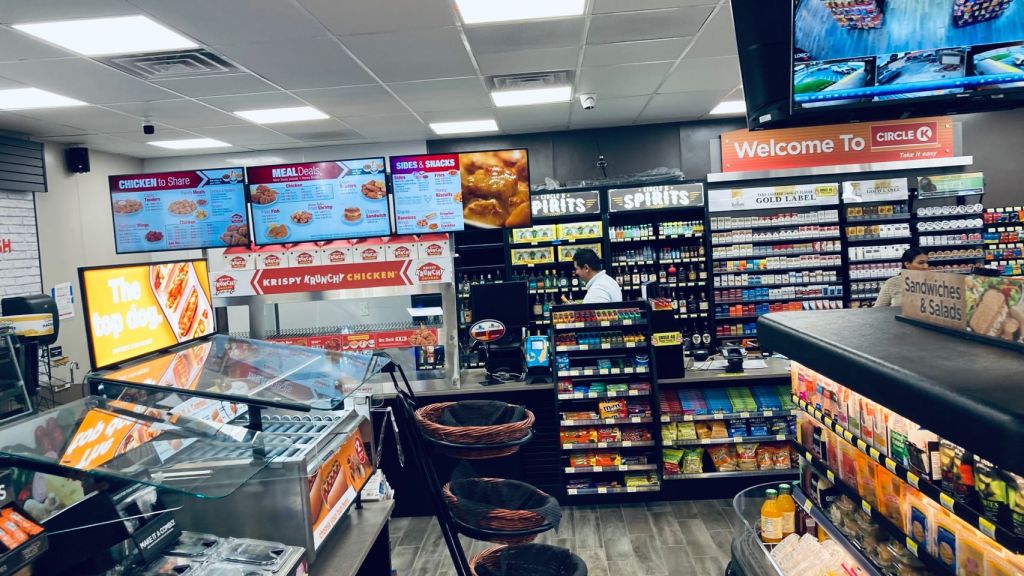Owner of Circle K stores reports steep profit drop, blames ‘headwinds, especially in US’
The owner of the Circle K supermarket chain, Alimentation Couche-Tard, reported surprisingly weak sales and profits in its latest quarter — and signaled that consumer spending in the US was especially weak.
The Canadian owner of chain convenience stores and gas stations suffered a 2.2% sales drop in the quarter that ended Feb. 4, even as adjusted profit tumbled to 65 cents a share — far below the 84 cents expected by analysts, according to data compiled by Bloomberg.
The company’s $623.4 million in profits marked a roughly 15.5% decrease from the period prior when Couche-Tard raked in $737.4 million.
The firm blamed the declines on weak customer traffic and “near-term headwinds, especially in the United States,” Chief Executive Officer Brian Hannasch said in a statement issued Wednesday.
Couche-Tard — which makes most of its revenues on fuel sales — also noted that “a portion of our customers remains impacted by challenging economic conditions.”
As a result, the company — which operates nearly 7,000 Circle K convenience stores across the US alone, as well as Holiday Stationstores, which are primarily located in the northwest, and Canadian chain Mac’s Convenience Stores — saw merchandise revenue per store, such as food and cigarettes, drop in all three of the company’s geographic segments.
It was the first time Couche-Tard saw such a drop in more than a decade, Stifel Financial analyst Martin Landry said in a note earlier reported on by Bloomberg.
However, 7-Eleven’s decline was even worse, “which is reassuring and suggests industry-wide weakness,” Landry added.
Couche-Tard, which had $19.6 billion in revenue in its latest quarter, operates a total of about 16,700 sites, mostly in the US and Europe, according to Bloomberg.
During the period, the company closed the acquisition of 2,175 European sites for $3.8 billion from French petroleum giant TotalEnergies SE. More than half of those are in Germany, Bloomberg reported.
Representatives for Couche-Tard did not immediately respond to The Post’s request for comment.
Though consumers everywhere are feeling the squeeze, Americans are still facing stubbornly high inflation rates as well as decades-high interest rates — which the Federal Reserve kept unchanged on Wednesday.
The Fed’s benchmark overnight interest rate, as expected, was held steady between 5.25% and 5.50%, where it’s sat since July.
Still, Fed Chair Jerome Powell affirmed central bankers’ view for three rate cuts this year.
Speaking after the two-day policy meeting, Powell said the timing of the much-anticipated reductions still depends on officials becoming more secure that inflation can continue to decline towards the Fed’s 2% target in an economy that continues to outperform expectations.
The decision on when to cut rates will depend on more data, Powell said, to determine if the disappointing readings that started the year continue.
The Fed’s next meeting is set to take place April 30 to May 1.
The latest inflation reading, meanwhile, showed that the figure rose 3.2% in February.
On a monthly basis, price growth edged 0.4% higher last month, driven primarily by the indexes for shelter and gasoline, which contributed to more than 60% of the advance.
According to AAA data, the national average for a gallon of regular gas rings in at $3.53 — up from the month-ago average of $3.27.
Last month’s Consumer Price Index — which tracks changes in the costs of everyday goods and services — marked yet another rise in consumer prices, which have not fallen year-over-year since President Joe Biden’s term began in January 2021.
The closest the economy has gotten to a yearly decrease since Biden took office was in July 2022, when the inflation rate remained “unchanged,” at a sky-high 8.5%.
Overall, prices are up a staggering 19% since December 2020, the month before Biden moved into the White House — despite the president’s Bidenomics agenda, which he has consistently claimed works to “reduce the [government’s] deficit.”





